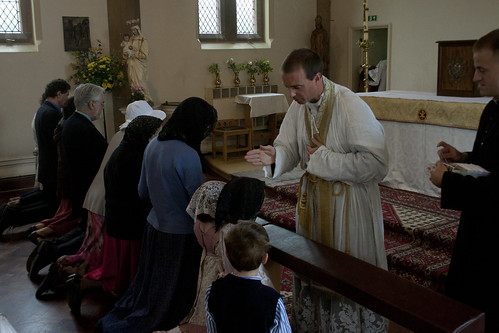 |
| Fr Anthony McCarthy FSSP giving First Blessings (after Ordination) following Mass |
One reason why a number of people probably think I'm mad, is that I don't take my children (those who haven't had their First Holy Communion) to the altar rails for a blessing during Communion. The reason is that the blessing of children at this time is, ahem, not actually allowed. Not at the Traditional Mass. Not at the New Mass. No blessings should be given during the reception of Communion.
Extraordinary Ministers of Holy Communion attempting to give blessings is a double abuse, because they can't give blessings at all. However, they probably shouldn't be there at all, since the Church's law only allows them to function in exceptional circumstances. (I'm talking about the Novus Ordo here: in the Extraordinary Form they aren't allowed at all.)
 |
| Veneration of a relic of St Anthony of Padua, after Mass at St Anthony of Padua, Oxford |
Fr John Zuhlsdorf has written a few times on this topic;
today he's
linked to another discussion of it by another priest. What surprises me a little about his discussion, and that of the priest blogger (Fr Shea) to whom he links, is that the only reason they give against the practise is that it is contrary to the rubrics. I also think it would be a good idea to make the point that very few people seem to be aware of the liturgical law on this subject, and (unless I've missed it) it's not an issue which has been raised by the Instructions combating liturgical abuses which Pope John Paul II issued. So I'm not condemning anyone to Hell fire for not knowing about this.
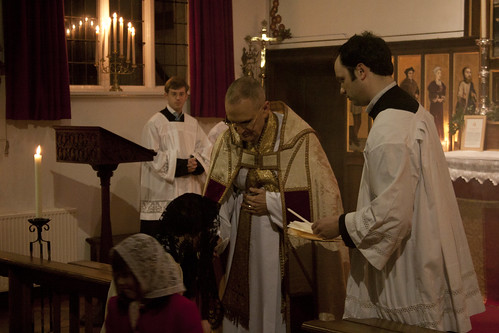 |
| Distribution of blessed candles, Candlemas, SS Gregory & Augustine's, Oxford |
The fact that the faithful aren't aware of the law, and the widespread nature of the practise, puts priests in a very difficult position, even if they do know the rule themselves. I think that, if we want priests to adhere to this law, we need first to spread the idea that there is a real problem here. The law is not just a matter of the legislator not having thought of this great idea; it protects the dignity of the Blessed Sacrament.
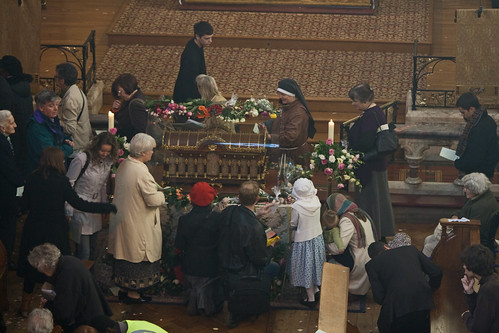 |
| Veneration of St Therese of Lisieux, Oxford Oratory |
The general principle, of which this is a particular application, is that priests may not give blessings in front of the exposed Blessed Sacrament. If the Blessed Sacrament is exposed, Our Lord Himself is present in a very particular way. It is quite wrong for priest to use their subordinate faculty for giving blessings in this Presence. In Benediction, of course, the whole idea is that the priest blessed the faithful with the Blessed Sacrament.
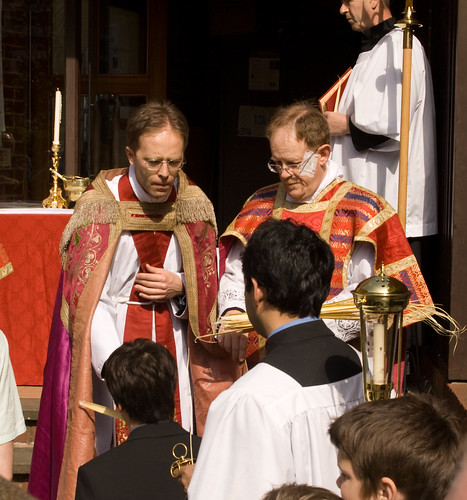 |
| Distribution of blessed palms, Palm Sunday, St William of York, Reading |
Everyone is given a blessing at the end of Mass, and this blessing has a special significance in the context of the Mass, just concluded, and the dismissal of the Faithful. I make a particular effort to get my children to pay attention to this, and to cross themselves. I also encourage them to go up to get ashes on Ash Wednesday, a palm on Palm Sunday, to have the Blessing of Throats on the feast of St Blaise, to kiss relics whenever these are proffered for veneration, to receive the First Blessings of newly ordained priests, and so on, as illustrated in the photos; they are always pleased to take part in these things, and they provide very good opportunities for catechesis. Going up to Communion, however, is something which really makes no sense unless you are actually going up for Communion. In the context of children, of course, the NOT being allowed up has importance in their preparation for First Communion, when they WILL be allowed up. (What is annoying, of course, is a baby being given a blessing simply because you've gone up yourself for Communion and you are obliged to hold him.)
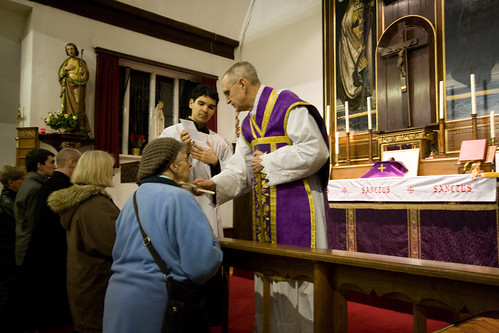 |
| Blessing of Throats on the Feast of St Blaise, SS Gregory & Augustine's, Oxford |
Blessings during the Communion of the Faithful? Just say no!






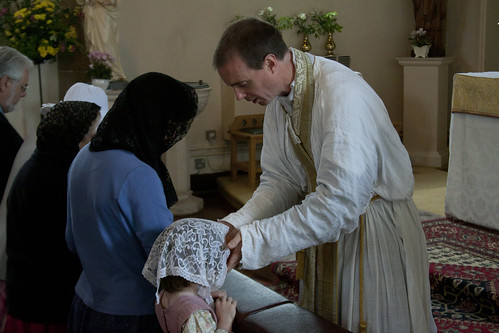
However in the EF the priest says over those who come to the rail. "Corpus Domini noster..." making the Sign of the Cross, he does this whether he subsequently gives them Holy Communion or not.
ReplyDeleteOf course the OF has no provision for such an occassion of prayer or blessing, there is merely the proclamation "Corpus Christi" followed by the communicants "Amen".
That is very interesting. Do you have a liturgical authority for that? Eg it's not mentioned in Fortescue.
ReplyDeleteNo, but neither can I find anything to suggest it is an abuse.
ReplyDeleteI would be interest to know if some else can.
It is not only children who come for blessings at Communion time, but those in irregular marriages and non-Catholics. Unless our Bishops write Pastorals on this subject to the people to inform them that such blessings are not permitted, it is very hard to refuse such a blessing which, when received with an open heart, is something of a spiritual communion. To refuse such blesings would only put a priest in very difficult circumstances with his parish and, I suspect, his Diocese.
ReplyDeleteYes indeed, that is the problem.
ReplyDeleteHave you seen this take on it?
ReplyDeletehttp://newtheologicalmovement.blogspot.co.uk/2012/04/whats-wrong-with-blessing-children-in.html#more
Interesting. I agree that the argument from the rubrics is weak. But he gives very little time to the real reason - the reason behind the rubrics. And his argument there only applies to the OF.
ReplyDeleteDoes he really think that, because in the OF the priest puts incense in the thurible on Holy Thursday when the Blessed Sacrament is on the Altar, priests should abandon the distinction completely? Does he really think it would be apropriate to give a priestly blessing instead of Benediction with the Blessed Sacrament during Exposition? That seems a bit hasty to me.